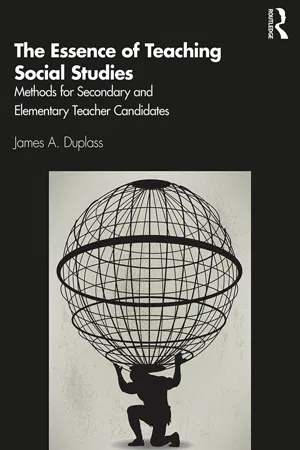
The Essence of Teaching Social Studies
Methods for Secondary and Elementary Teacher Candidates
- 284 pages
- English
- ePUB (mobile friendly)
- Available on iOS & Android
The Essence of Teaching Social Studies
Methods for Secondary and Elementary Teacher Candidates
About this book
Designed for use in elementary and secondary social studies education courses, this book supports the teaching of social studies methods in a range of educational settings. By highlighting long-standing content and principles of social studies education in a concise and direct way, this volume offers the building blocks of a comprehensive course, for use as springboards to the effective presentation of professors' desired course emphases. With sections on foundations, subject areas, and best practices, this text explains the intersection between the "modelling" role of social studies teachers as democratic citizens, social studies fields of study, and strategies implemented in the classroom to encourage students' critical thinking and values formation.
Frequently asked questions
- Essential is ideal for learners and professionals who enjoy exploring a wide range of subjects. Access the Essential Library with 800,000+ trusted titles and best-sellers across business, personal growth, and the humanities. Includes unlimited reading time and Standard Read Aloud voice.
- Complete: Perfect for advanced learners and researchers needing full, unrestricted access. Unlock 1.4M+ books across hundreds of subjects, including academic and specialized titles. The Complete Plan also includes advanced features like Premium Read Aloud and Research Assistant.
Please note we cannot support devices running on iOS 13 and Android 7 or earlier. Learn more about using the app.
Information
Part 1
Social Studies Education
NCSS Code of Ethics Principle Four
- Effective social studies instruction necessitates an environment in which social studies professionals and students are free to study, investigate, present, interpret, and discuss relevant facts and ideas. Those engaged in social studies instruction have a responsibility to accept and practice the democratic commitment to open inquiry and to approach controversial issues in a spirit of inquiry rather than advocacy.
- Social studies professionals have an obligation to exercise and maintain academic freedom in the classroom and to abide by such reasonable considerations as the intent of the course and the age and sophistication of students.
- The social studies professional should acknowledge the worth and tentativeness of knowledge. He or she should engage in a continuous search for new knowledge, retaining both the right and the obligation as a student scholar to doubt, to inquire freely, and to raise searching questions. The social studies professional has an obligation to distinguish between personal opinion and beliefs that can be supported by verified facts and to impart the knowledge of these differences to his or her students.
- Social studies professionals have an obligation to establish classroom climates that support student rights to know, to doubt, to inquire freely, to think critically, and to express openly.
A Proposition
Resources
References
1 Definitions and Propositions
Definitions
Table of contents
- Cover
- Half Title
- Title Page
- Copyright Page
- Dedication
- Table of Contents
- List of Figures
- About the Author
- Foreword
- Acknowledgments
- Professors’ Preface
- Students’ Introduction
- PART 1: Social Studies Education
- PART 2: Schools, Curriculum, and Standards
- PART 3: Best Practices in Social Studies Education
- Conclusion
- Index